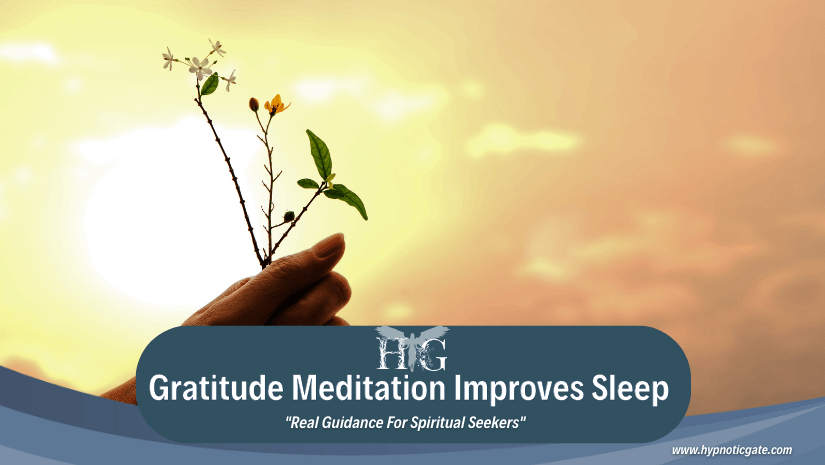
What meditation is most effective for improving sleep in people with racing thoughts?
According to a study, many individuals have problems falling asleep because of racing thoughts, leading to tension and worry. Several forms of meditation might be beneficial for these people to assist them in enhancing the quality of their sleep.
Gratitude meditation can be an effective method for reducing racing thoughts and stress that can disrupt sleep. You can reduce worry and anxiety by being grateful for the positive things in life and appreciating what already exists.
Loving-kindness meditation, or compassion meditation, can also be an effective method for improving sleep in people with racing thoughts. Practicing compassion and wishing others well-being can reduce negative emotions such as stress and anxiety that disrupt sleep.
Progressive muscle relaxation can also be an effective method for improving sleep. This method involves tensing and relaxing different muscle groups to reduce tension and anxiety that disrupt sleep.
Finally, mindfulness, or mindful awareness, can also be an effective method for improving sleep in people with racing thoughts. By focusing on the present moment and observing thoughts and feelings without judgment, you can reduce worry and anxiety that disrupt sleep.
“Gratitude is not only the greatest of virtues but the parent of all others.”
– Cicero
Things You Should Know About Gratitude Meditation
- Gratitude meditation lifts your mood by focusing on positive life aspects.
- This practice complements a minimalist lifestyle, emphasizing what truly matters.
- Sufism and Taoism influence gratitude meditation, adding spiritual depth.
- Both philosophies teach you to live in harmony with your surroundings.
- Overall, gratitude meditation can enrich your emotional and spiritual well-being.
How Does Gratitude Meditation Work to Improve Sleep?

In gratitude meditation, one concentrates on thinking positively and feeling appreciative for what they have rather than on what they don’t or don’t have. Through cultivating thankfulness, one may learn to appreciate the wonderful things in life and feel happier and more content. An excellent way to relax that lowers stress and anxiety and can help you sleep better is gratitude meditation.
“Overthinking can keep you up at night, but it’s important to remember that you can’t solve all your problems in a single night.”
Sure, focusing on what you’re grateful for can boost your mood. Gratitude meditation helps you pay attention to the good stuff—your friends, good health, or even a sunny day. It pairs well with a minimalist lifestyle, where you clear out the junk and focus on what matters.
The practice also borrows ideas from Sufism and Taoism. Sufism encourages a more profound spiritual bond, and Taoism promotes going with the flow of life. Both can make you more thankful for what you’ve got.
What Philosophies Influence Gratitude Meditation?
Sufism and Taoism have impacted gratitude meditation. Sufism encourages a deeper spiritual bond with God, while Taoism promotes harmony with life’s natural flow.
Can Gratitude Meditation Help Reduce Stress?
Focusing on positive aspects can reduce stress by lowering cortisol levels and encouraging relaxation.
Gratitude meditation works by shifting your focus from negative thoughts and emotions to positive ones. It can help you develop a more positive attitude towards life and improve your overall well-being. Research has shown that practicing gratitude meditation can increase positive emotions, improve relationships, reduce stress and anxiety, and even improve physical health.
How to Perform Gratitude Meditation: A Step-by-Step Guide
- Lie down, whichever feels better for you.
- Close Your Eyes: Shut your eyes to help block out external distractions and focus inward.
- Take Deep Breaths: Inhale deeply through your nose, hold for a moment, and exhale through your mouth. Do this a few times to relax your body and mind.
- Set an Intention: Think briefly about what you want to achieve with this meditation, such as a sense of calm or increased gratitude.
- Focus on Gratitude: Start thinking about what you’re grateful for. This could be people, experiences, or even small everyday things.
- Visualize: Create a mental image of each thing you’re grateful for. Imagine it filling you with warm, positive energy.
- Speak It: Optionally, you can verbally express gratitude for each item, saying, “I am grateful for my family.”
- Stay Present: If your mind wanders, gently bring it back to gratitude.
- Wrap It Up: After about 5-10 minutes, or when you feel you’ve covered all you’re grateful for, bring your focus back to your breathing.
- Open Your Eyes: Slowly open your eyes, take a few more deep breaths, and carry your sense of gratitude into the rest of your day.
What is Progressive Muscle Relaxation and How Can It Help People Sleep Better?
Progressive muscle relaxation is a technique that involves tensing and then relaxing the muscles in the body to promote relaxation. By doing this regularly, one can learn to recognize and release body tensions, promoting a sense of calm and relaxation. This can reduce stress and adrenal activity, which can help people sleep better by reducing cortisol levels in the body.
“Overthinking is often the result of fear and uncertainty. Learn to manage your emotions, and you’ll be able to sleep better at night.”
– Susan Gale
What Other Techniques Can Be Used to Manage Overthinking and Improve Sleep?

To stop overthinking and get better sleep, try these methods:
- Work Out Regularly: Exercise releases endorphins that lower stress, helping you sleep better.
- Practice Self-Hypnosis: Use techniques to calm and prepare your mind for sleep.
- Read Philosophy: Dive into Sufism or other philosophies to find mental peace, making sleeping easier.
- Wim Hof Breathing: Use this breathing method to relax your body and mind, setting the stage for good sleep.
- Pray Daily: Faithful prayer can give you peace, helping you fall asleep easier.
- Take Melatonin: Use melatonin supplements to adjust your sleep cycle and improve sleep quality.
Each technique offers a unique approach to easing your mind and improving your sleep.
“Gratitude makes sense of our past, brings peace for today, and creates a vision for tomorrow.”
– Melody Beattie
Can Meditation Help Improve Sleep for People Who Suffer From Racing Thoughts?
Yes, it can! Practicing meditation can help reduce stress and anxiety, which promotes calmness and relaxation in the mind. Additionally, meditation can help reduce the production of the stress hormone cortisol and increase the production of the sleep hormone melatonin, which can lead to better sleep quality.
Racing thoughts can make it difficult to relax and unwind, which can cause sleep problems. Meditation can help calm the mind and help manage excessive worry and anxiety that can negatively affect sleep.
Gratitude unlocks the fullness of life. It turns what we have into enough, and more. It turns denial into acceptance, chaos to order, confusion to clarity. It can turn a meal into a feast, a house into a home, a stranger into a friend.”
Melody Beattie
How Gratitude Meditation Can Improve Sleep in People with Racing Thoughts?
Those with racing thoughts might enhance their sleep by meditating on gratitude. In gratitude meditation, one focuses on the positive and acknowledges the good in life. This can assist people in putting their worries aside in favor of concentrating on what is significant and constructive. One can enhance sleep and reduce stress by routinely expressing thanks.
According to research, people who meditate on thankfulness report feeling more pleasant and less negative emotions like worry and sadness. When it’s time to go to bed, this may make people feel more at ease and peace, enhancing their sleep.
Practicing gratitude meditation can be a simple and effective method for people with racing thoughts to improve their sleep and mental health.
Can Gratitude Meditation Be Helpful for Individuals With Anxiety or Depression?
Gratitude meditation can be a game-changer for anxiety and depression. Research shows that feeling thankful triggers the prefrontal cortex, pumping out mood-boosting hormones like serotonin and dopamine. This can dial down the stress-inducing activity in the amygdala, the brain’s anxiety center. It’s like hacking your brain for more happiness and less stress.
Final Thoughts
Hey thereHypnoticgate.com lovers! Thank you so much for diving deep with me into the transformative world of gratitude meditation today. Isn’t it incredible how something as simple as focusing on what we’re thankful for can shift our entire mindset? We’re always exploring spiritual meanings, angelic messages, and more here. You’ve found the right place if you’re hungry for wisdom that enriches your soul!
Got questions? Reach out! I’m Jennifer, your go-to for all things mystical and enlightening. Super excited to help you on your journey to inner peace and higher wisdom. Don’t forget you can also follow me on LinkedIn and Pinterest for extra inspiration and insights. Your support means the world to me!
Stay grateful, stay enlightened, and let’s make life magical together! 🌟
What Other Benefits Can Gratitude Meditation Have for People With Racing Thoughts?
Research has shown that gratitude meditation can increase positive emotions and decrease negative emotions, such as anxiety and depression. It can also help people feel more relaxed and calm at bedtime, improving sleep.
How Does Gratitude Meditation Work to Improve Sleep?
Gratitude meditation can help people let go of worrying thoughts and instead focus on what is positive in life. By regularly practicing gratitude, one can reduce stress levels and improve sleep.
How Often and for How Long Should One Practice Gratitude Meditation to Improve Sleep?
Practicing gratitude meditation regularly every day or several times a week is best. Even short sessions can have positive effects on sleep and mental health.
What Are Racing Thoughts, and How Does It Affect Sleep?
Racing thoughts are when you overthink a situation or problem, leading to negative thoughts and feelings. This can affect sleep by activating the brain’s amygdala, increasing anxiety and stress. Overactive cortisol, a stress hormone, can also negatively affect sleep.
Other Articles:
